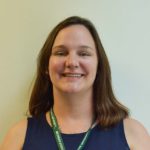Featured #MSUrbanSTEM Sustainability Fellow: Annmarie Thomas
 Featured Sustainability Fellow: Annmarie Thomas
Featured Sustainability Fellow: Annmarie Thomas
Bio: Annmarie has taught high school math in multiple cities throughout the U.S. for over a decade. She began her #MSUrbanSTEM Sustainability Fellowship while serving as an International Baccalaureate Middle Years Programme Coordinator at Ogden International School of Chicago. Annmarie recently relocated to Michigan and is teaching math and robotics in Saginaw Public Schools.
#MSUrbanSTEM Reflection
My year as an MSUrbanSTEM Sustainability Fellowship has been filled with changes. I transitioned from being an International Baccaulareate Coordinator in Chicago to a middle and high school math teacher in Saginaw, Michigan. While I was initially hired to teach math at one of their traditional high schools, I was soon transferred to the district’s gifted and talented magnet school. I had no idea what to expect, but transitioned into the new school well aware that I made a commitment to myself to serve as a leader. I spent a lot of time this year thinking about what it means to be an educational leader and have a few takeaway lessons as a result.
Lesson 1: Be courageous and do what you know is right for your students.
I had a lot of questions about how my experience as an MSUrbanSTEM Sustainability Fellowship could complement the good work already being done at my new school and how, coming in as a newbie, I might possibly take a leadership role in one of the highest performing schools in the state, where many of its teachers have been with the program for a decade or more. As I learned about the school and my new colleagues, I discovered that the overwhelming pedagogical approach in the math department was mostly traditional, lecture-based instruction with lots of long problem sets for homework. The description of my teaching style was met with trepidation, a little curiosity, and an outright warning that a flipped classroom, “probably wouldn’t work” for the students at this school.These conversations left me feeling nervous about how best to proceed, but I ultimately decided to move forward with the flipped classroom and lots of student-centered learning. Initially, the transition was not perfect, but the students and I persisted and they quickly adjusted to the new teaching methods. Positive feedback from the students, their parents, and administration began circulating. Students were successful on highly rigorous math content and, more importantly, they were enjoying the learning process (or at a minimum weren’t dreading it). The success led to more conversations with colleagues about my instruction and those conversations led to opportunities to share some new tools and strategies with my peers. There were several other events throughout the year, where I probably would have reserved my opinion or suggestion, but instead took a chance and shared my ideas. Not all of my ideas were implemented, but my risk-taking spurred reflection and conversations that ultimately benefited the larger school community.
Lesson 2: Never rest on your laurels.
Throughout the year, I used technology traditionally aligned with math instruction, such as, graphing calculators, Desmos, Geogebra, and various apps on NCTM’s website, but my role as a fellow helped keep a voice in my head reminding me to do more. I look for new tools and innovative repurposing of technology to help create unique learning experiences. My students have used photographs, videos, infographics, sketchnotes, 3D printing and more to explore and explain concepts in math. Trying to integrate new technology and create unique learning experiences when I just as easily could have used a more direct approach, allowed for the students to view math differently and gain a greater appreciation of its role. Many of the learning experiences led to unexpected wins, such as, a student who was an avowed hater of all things STEM finding that she is actually amazing at CAD and loves working with it, or several other students wanting to further explore and possibly pursue STEM fields as a result of positive learning experiences this year.
Lesson 3: Relationships are everything and your personal learning network is the second most important set of relationships in your career (students taking the #1 spot).
It is impossible to lead without positive relationships. So obvious, yet missed by many and easier said than done when one knows exactly zero people in one’s new district. When I was first hired, I emailed the district tech coaches to let them know about my participation in the MSUrbanSTEM Sustainability Fellowship and my desire to partner with them in some way. I signed up for any and all district professional development about integrating technology in the classroom. I reached out to parents to explain my pedagogical approach and ask for input and advice from all of them, especially if they held a job in a STEM field. I shared my successes and failures with my colleagues and sought feedback from them on my ideas. In making these connections, an informal system of collaboration emerged. I received valuable insights and ideas from peers both in and out of my building, as they did from me. Multiple teachers began observing my classroom to learn more about its structure and my strategies and my experience with ed tech moved from being an isolated experiment contained in my classroom to a learning tool shared with other educators throughout the school and the district. Had I not pushed myself to reach out and participate, very few would have known or cared about what was occurring in my classroom.